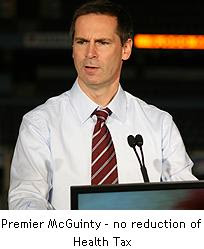 There's no chance the annual health tax of up to $900 a person will be scrapped, according to Ontario Premier Dalton McGuinty, despite soaring government revenues and a looming legislative review of the levy.
There's no chance the annual health tax of up to $900 a person will be scrapped, according to Ontario Premier Dalton McGuinty, despite soaring government revenues and a looming legislative review of the levy.
While the Liberal government will launch an examination of the controversial tax in the New Year, McGuinty struck a decidedly Grinch-like tone yesterday for those who hoped he might give taxpayers a yuletide surprise.
"That was raised during the course of the campaign. I dealt with that very specifically and straightforwardly and said, `No, we cannot eliminate or reduce our health tax,'" the premier said in an interview with CJBK radio's Steve Garrison in London.
"We need that money to continue to invest in our continuing capacity to assure that we've got health care there for people when we need it," he said.
The health premium, which was introduced in the 2004 budget just months after McGuinty had won power with a promise not to increase taxes, brings in about $2.6 billion a year.
Coincidentally, in last Thursday's economic statement, Finance Minister Dwight Duncan revealed that higher than expected personal and corporate tax revenues mean this year's income projections have grown by $2.6 billion, from $91.5 billion to $94.1 billion.
Progressive Conservative Leader John Tory, who campaigned to phase out the health tax, said the surplus proves the Liberals could afford to scrap the premium.
But Duncan also disclosed in his economic statement that spending would rise by $2.2 billion, to $93.3 billion from $91.1 billion.
McGuinty didn't think it was necessary to make apologies for retaining the health tax or for the broken promise of the 2004 campaign.
"We've got huge pressures associated with the delivery of health care, and what I said to Ontarians during the course of the campaign is that if I'm elected I will continue to invest in our health-care system to ensure that at all times we always have the capacity to care for each other in times of sickness," he said on CJBK.
About 42 percent of all taxpayers earn enough to pay the levy, which rises to a maximum of $900 a year, depending on income.The Star
Editor's opinion:
"I hope they will use those billions to invest in efficiency, better management of health care institutions and IT so we can have that tax cut next time and make our health care system really accessible and free for everyone!"


No comments:
Post a Comment